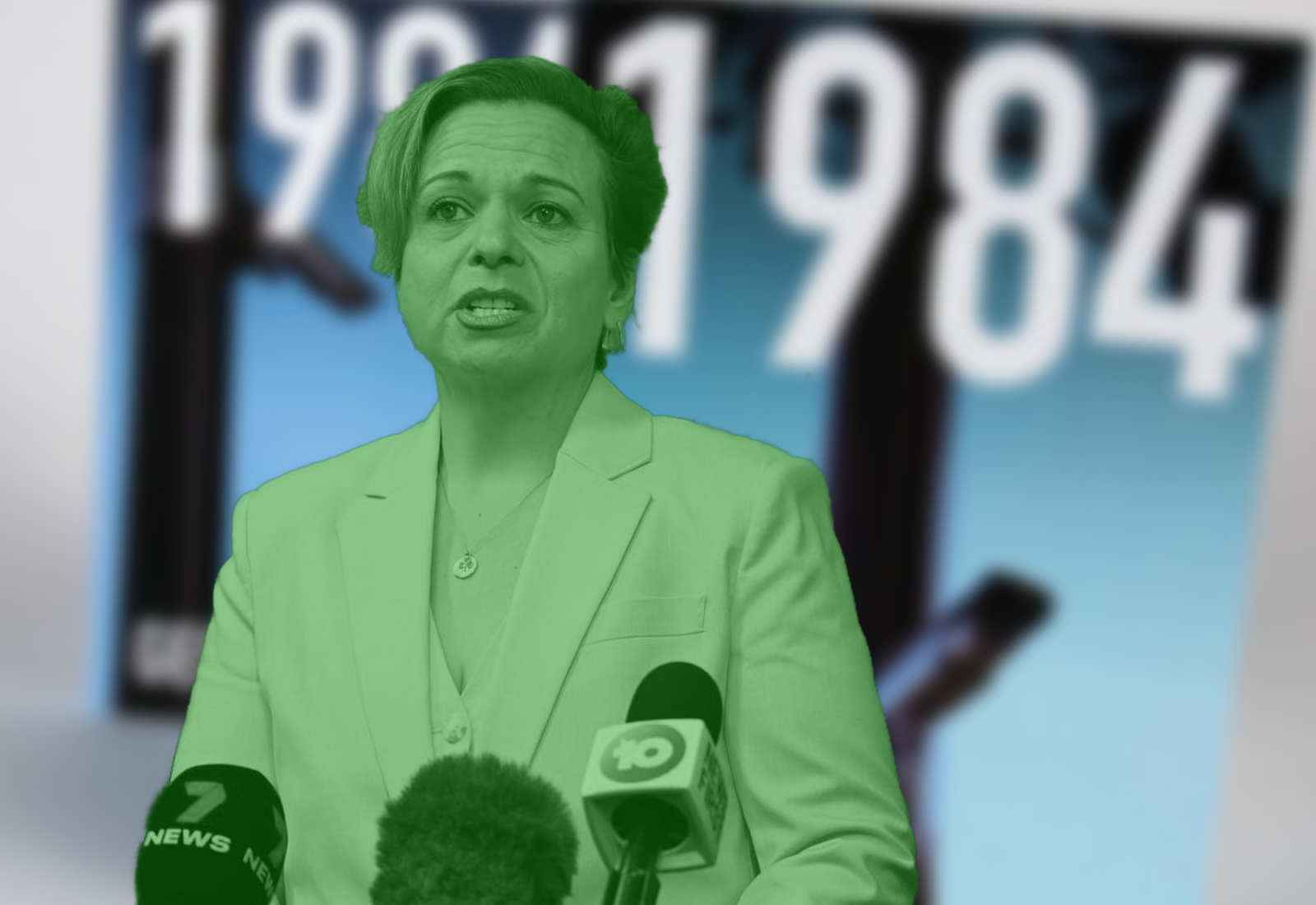The federal government is moving to ban what it calls ‘disinformation’ and ‘misinformation’ in an initiative similar to legislative moves in Europe and the United Kingdom.
By targeting variants of the word ‘information’, the government is doing something that does not stand up to logical scrutiny and which is an attempt to cover up a much darker agenda.
It is not just an effort to take away free speech for those not approved by the authorities; it is a sneaky attempt to impose what the novelist George Orwell in his novel 1984 memorably called ‘thoughtcrimes’ – thoughts, beliefs and doubts that contradict the government’s position.
Michelle Rowland, the Minister for Communications, issued a press release earlier this year saying that the government is seeking to provide the Australian Communications and Media Authority (ACMA) with “new powers to hold digital platforms to account and improve efforts to combat harmful misinformation and disinformation in Australia.” She described it as a “major step forward in addressing the spread of online misinformation and disinformation which has grown rapidly in scale and speed.”
Rowland also said ACMA would be given its new information-gathering and record-keeping powers “while balancing the right to freedom of expression so fundamental to democracy.”
Freedom of expression, it seems, will only be available if the authority permits it.
The government says ACMA will not have the power to determine what is “true or false on individual posts” and that the move will have no impact on professional news content or authorised electoral content. Rather, the target will be social media companies, especially X – the platform formerly known as Twitter.
This is vaguely conceptualised, bad law.
How are misinformation and disinformation to be defined? Prima facie, it would seem to start with identifying something that is false. So does this apply to the forecasts of economists, who routinely make predictions that are wrong? Is that disinformation or misinformation worthy of removal?
Obviously not. But why not? Economic forecasts, if believed, could be quite harmful to people.
But the government is saying it would not apply to the truth or otherwise of individual posts. It will be posts that challenge what the government says, particularly about matters of public health.
To understand the fuzziness of the proposed regulation, it is helpful to start with some basic definitions. ‘Information’ is defined as “facts about something or someone conveyed or represented by a particular arrangement or sequence of things.” This is passive.
Freedom of expression, it seems, will only be available if the authority permits it.
Information in itself does not perform any acts, it is just writing or symbols put into a medium, such as a book or an online post. Doing nothing, it cannot be the subject of any laws.
Penalising the Australian Bureau of Statistics for putting out its statistical measures would be, obviously, absurd. The target of the legislation is rather the intent of the person creating the information to convey a particular meaning.
‘Disinformation’ is defined as information that is intended to mislead and to cause harm, while misinformation has no such intent and is just in error. (Mal-information is considered to be something that is true, but by saying it there is an intention to cause harm.)
This raises what are essentially literary issues about how meaning is created. In literary criticism there is a notion called the intentional fallacy, which says that the meaning of a text cannot be limited to the intention of the author. Nor is it possible to know definitively what that intention is from the work.
The meanings derived from Shakespeare’s works, for example, are so multifarious many of them cannot possibly have been in the Bard’s mind when he wrote the plays 400 years ago. It is the same problem with even the most modest of online posts. How is it possible to know definitively what kind of meaning the author intends? How do we know that there is no irony, double meaning, pretence or other artifice? Establishing intent is always problematic in law.
That is the first problem. The second one is: if the creation of meaning is the target of the proposed law – to proscribe what are deemed to be certain kinds of meaning – how do we know what meaning the recipients are getting? There are some popular literary theories which come under the umbrella term deconstructionism – the claim that there are as many meanings from a text as there are readers, and that “the author is dead”. This suggests any intended meaning by the creator is irrelevant.
Although this is a rather ridiculous exaggeration, it is indisputable that different readers get different meanings from texts. Some people reading this article, for example, might be persuaded. Others might consider it evidence that I have a nasty agenda and am out to damage the body politic.
As a career journalist, I have always been shocked at how different readers’ responses are to even the simplest of articles.
To state the obvious, we can all think for ourselves. The legislation pays no attention to this. Instead, it characterises consumers of online material as robots having data fed into them, not humans capable of vastly different responses and interpretations.
It is all justified as protecting people from bad influences for the common good. This is not merely patronising and infantilising; it treats us as mere machines ingesting data.
The government will not apply the same standards to itself, of course, perhaps because the government always intends well. That sentence may or may not be intended to be ironic. I leave it up to the reader to decide.
Approved outlets will be exempt, which further institutionalises the logical fallacy of appeal to authority, whereby it is thought that if authority figures say something it must be right.
By using variants of the word ‘information’ rather than ‘meaning’ and ‘intent’ the government is trying to sound objective. But it is digging a logical hole for itself. It is not about the information, the words on the page or post, but the human actions. That they have not made this clear indicates the fundamental dishonesty of the initiative.
There will be understandable protests about the restrictions on free speech, but that is not explicitly protected in Australia as it is, for example, in the United States First Amendment.
According to the federal Attorney General, Mark Dreyfus, the High Court has held that “an implied freedom of political communication exists as an indispensable part of the system of representative and responsible government created by the Constitution.” Section 16 of the Human Rights Act 2004 in the Australian Capital Territory states that “everyone has the right to hold opinions without interference.” Section 15 of the Charter of Human Rights and Responsibilities Act 2006 in Victoria says that “every person has the right to hold an opinion without interference.”
This action seems to be an attempt to restrict or remove even those weak protections. It is to be hoped that it will fail in both the courts and the court of public opinion.
If you wish to republish this original article, please attribute to Rationale. Click here to find out more about republishing under Creative Commons.
Image: Colin Dunn (Flickr, CC); Michelle Rowland MP (Facebook)














